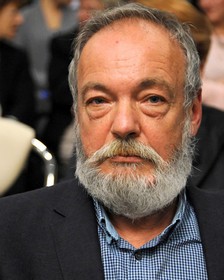
Srđan Hofman (1944, Serbia) acquired his undergraduate degree in composition at the Music Academy in Belgrade (today’s Faculty of Music) in 1968 under the supervision of Stanojlo Rajičić and then also an MA degree in the same class in 1972. Also, he spent two relatively brief periods pursuing further studies abroad. He remains active today as a professor emeritus of composition at the Faculty of Music and multimedia art at the University of Arts in Belgrade, as well as the founder and director of the Faculty’s Sound Studio. He also produces scholarly work in music theory related to issues in contemporary music and has authored a large number of studies published in scholarly journals, as well as the book Osobensti elektronske muzike (Particularities of Electronic Music).
Hofman’s oeuvre comprises numerous orchestral, vocal-instrumental, chamber, electro-acoustic, solo, and choral works. He has won many awards, including two first awards of the Composers’ Forum for his works Koncertantna muzika (Musica concertante, 1994) and Znakovi (Signs, 1995), the Stevan Mokranjac Award for Gledajući u ogledala Aniša Kapura (Looking at the Mirrors of Anish Kapoor, 2011), Composer of the Year Award for Ogledalo (Mirror, 2012), the Composers’ Association of Serbia Award, and the Great Plaque of the University of Arts in Belgrade.
Bez jave – u potrazi za „Pjeroom“ Arnolda Šenberga (No Waking – In Search of Arnold Schoenberg’s “Pierrot”) for flute, clarinet, violin, violoncello, mezzo-soprano, piano, and electronics was written in 2017 as a setting of a few lines from Vladimir Petković Dis’s poem “Prestanak jave” (The Stopping of Wakefulness); it is dedicated to the members of Construction SiteContemporary Music Ensemble.
In this work, in terms of the character and atmosphere they invoke, my different vocal-instrumental interpretations of Dis’s nightmarish vision of the inevitable alternation of day and night wherein “all events and reality cease”, are intertwined, crisscrossed, juxtaposed, and combined with electronically and radically modified audio recordings of fragments from the first, second, sixth, and seventh movement of Schoenberg’s Pierrot Lunaire, composed for the same kind of chamber ensemble and previously recorded by Construction SiteContemporary Music Ensemble, who also interpret Bez jave.


